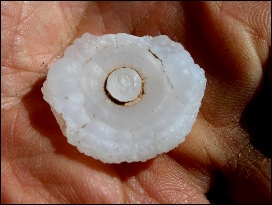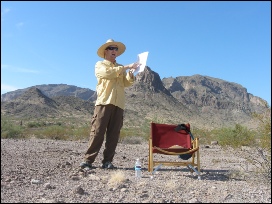

Rock arches are sprinkled through the Western Desert.
Several are near the Tonopah
Belmont mine. Always keep your eyes open for similar erosion created. ‘windows’.
“Arizona’s dry climate and varied topography make it a geology wonderland, an open
textbook of geology.”
Halka Chronic
Roadside Geology of Arizona

Chalcedony forms a Desert Rose.
Short video by Geologist K. Murry about Saddle Mountains volcanic formation during Tonopah Area Coalition geology workshop.
See outlines covering subduction and volcanic action.

A few
basic rock hounding tips when visiting the Western Desert.
Rock hounding remains a popular hobby and is allowed on BLM property including
Wilderness Areas. Good maps are needed to avoid private property and State Trust
lands.
Saddle Mountain has been listed as a rock hunting site since
the 1940’s so fire agate is a bit harder to find. But Belmont Mountain, Fourth of
July Butte, Painted Rock and Eagletail Mountain are listed in current rock hounding
guides also.
The Crescent includes 10 mountain ranges in the Basin and Range Province. Numerous
volcanic features like Woolsey Peak, Courthouse Rock, and Saddle Mountain make geology
a fascinating feature within this region.
Here geology plays a major role in
the character of the hills and mountains which govern plants and wildlife. More
recently geology has governed the ways of man.
Another feature is the Sentinel
Lava Field where the north edge defines the trough that creates the diagonal flow
of the Gila River, starting near Arlington. This geologic feature is the youngest
example of volcanism in Arizona.
These are just a few of the many geology elements
within the Western Desert. See Saddle Mountain Review of Geology for more details.

| Homesteads |
| Mines |
| Trails |
| Courthouse Rock |
| Sunshine Sky |
| Desert Bighorn Sheep |
| Field Notes |
| Reptiles |
| Desert Life |